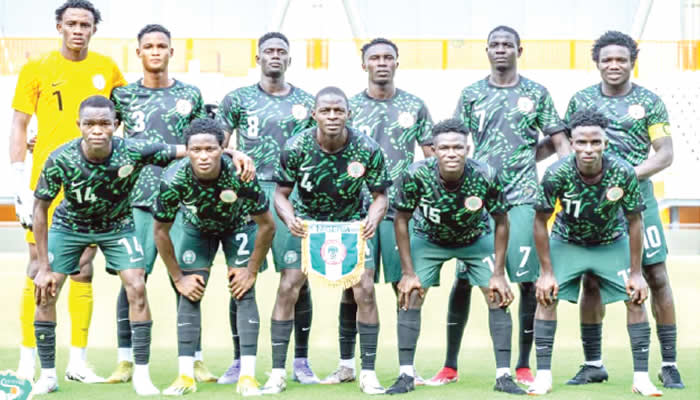The year 2005 marked a zenith for Nigerian youth football. The Flying Eagles, overflowing with prodigious talents like Taye Taiwo, Isaac Promise, and Victor Obinna, conquered the U-20 Africa Cup of Nations in Benin Republic, securing Nigeria’s fifth continental title. This triumph ignited national expectations and heralded the arrival of a golden generation poised to dominate both the U-20 World Cup and the senior national team for years to come. The team, bolstered by the additions of Mikel Obi and Sani Kaita, embarked on a memorable journey to the U-20 World Cup final, ultimately succumbing to a Lionel Messi-led Argentina. While the tournament showcased the team’s immense potential, it also marked the beginning of a complex narrative of fulfilled and unfulfilled promises for these budding stars.
The post-2005 era witnessed a stark contrast between the initial promise and the eventual reality for many of these young players. While 153 players represented Nigeria at the U-20 AFCON level since that golden year, only a fraction successfully transitioned to the Super Eagles. A mere 45 players earned senior caps, with the majority limited to friendly matches, Olympic tournaments, or appearances with the Super Eagles B team. An even smaller number, just 14, participated in major senior tournaments like the AFCON or the FIFA World Cup. The pinnacle of Super Eagles representation was reached by an even more select group, with only eight players earning more than ten caps. Ahmed Musa, Nigeria’s most capped player, stands out amongst this group, followed by players like Elderson Echiejile, Taye Taiwo, and Victor Obinna. This data reveals a significant bottleneck in the pathway from promising youth prospects to established senior internationals.
The individual journeys of the 2005 U-20 cohort offer a tapestry of mixed fortunes. Taye Taiwo emerged as a Super Eagles regular, featuring prominently in three AFCONs and the 2010 World Cup before fading from the scene. Onyekachi Apam’s career was curtailed by injuries despite initial success, including an Olympic silver medal. Victor Obinna, while captaining the silver-medal-winning 2008 Olympic team, never fully cemented his place in the senior squad. Other members of the 2005 generation, like Ambruse Vanzekin, Kennedy Chinwo, Monday James, Isaac Promise, Solomon Okoronkwo, Olubayo Adefemi, and Dele Adeleye, all experienced varying degrees of success and setbacks, highlighting the unpredictable nature of a football career.
Subsequent U-20 generations, while producing some notable Super Eagles players, failed to replicate the success of the 2005 cohort. Players like Ahmed Musa, who became the first Nigerian to score in two World Cups, emerged as shining examples. However, others like Nwankwo Obiora and Lukman Haruna, despite initial promise, couldn’t maintain their trajectory. Players from the 2014 World Cup squad, such as Michael Uchebo and Ramón Azeez, also struggled to secure long-term international careers. The more recent U-20 squads of 2019 and 2023 produced even fewer senior internationals, signifying a concerning trend in the development and transition of young Nigerian talent.
The 2005 generation remains a benchmark for Nigerian youth football. Ten players from that squad, including Taiwo, Obinna, and Akpeyi, transitioned to the senior team, more than any subsequent Flying Eagles squad. This generation set a standard that has proven difficult to match. The declining number of U-20 graduates successfully making the leap to the Super Eagles parallels a decline in performance at the youth level. The Flying Eagles failed to qualify for the U-20 AFCON in 2017 and 2021, and while the quarter-final appearance at the 2023 U-20 World Cup offered a glimmer of hope, it fell short of the lofty heights achieved in the early 2000s.
As the 2025 U-20 AFCON commences, a new generation of Flying Eagles carries the weight of history and expectation. Armed with a legacy of seven continental titles and fresh off a WAFU Zone B Championship victory, the team, under the guidance of coach Aliyu Zubairu, aims to reclaim their dominance in African youth football. The squad boasts exciting talents like Kparobo Arierhi, Daniel Bameyi, and Nathaniel Nwosu, and their impressive qualification campaign suggests a renewed sense of purpose. The tournament presents an opportunity to not only secure another continental title but also to finally fulfill the potential that has eluded Nigerian youth football for two decades. The journey ahead will be challenging, navigating a group that includes Morocco, Kenya, and Tunisia. While reaching the semi-finals and securing qualification for the U-20 World Cup is a minimum target, the ultimate goal remains to restore Nigeria’s place at the apex of African youth football. The 2025 U-20 AFCON is not just another tournament; it represents a chance to reignite a dream and usher in a new era of success for Nigerian football.














